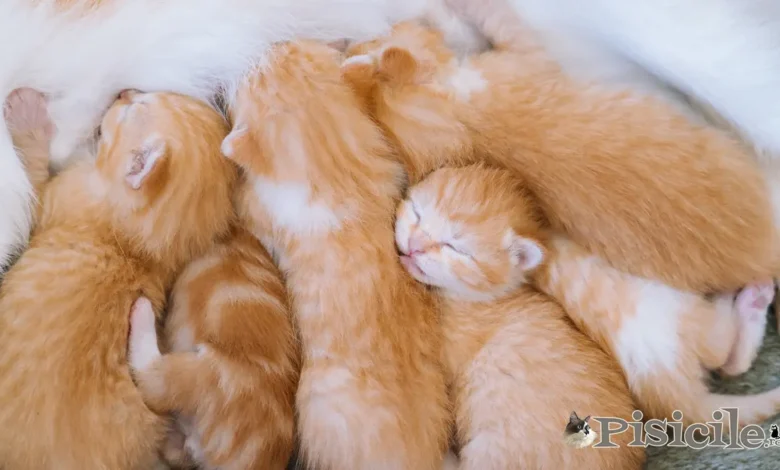
Before we see what are the signs of pregnancy in cats and how we can help our cat during pregnancy and birth, a joke found on social media about this topic:
“– How can I tell if my cat has babies in her belly?
- When you will see them walking around the house...” – that's what the question and answer sounded like on a social network. 😊
When you have a cat at home and you have decided that she can give birth to your "grandchildren", it is important to be informed about what her pregnancy entails, the birth of the kittens, but also the period after.
Cats, like women, have a period of maximum fertility when they can become pregnant. Cats can go into heat every three weeks, so the probability of becoming grandparents is very high.
The cat's gestation lasts between 63 and 70 days, but to be able to remember the period better, on average, the gestation lasts 9 weeks. Often, the cat may not show any physical symptoms of pregnancy.
The cat can give birth to 1 to 8 kittens, their number varying depending on the age of the mother and the breed. Normally, the cat makes 3-5 litters.
In the first phase, a thorough check-up is necessary to establish the health status of the cat and her kittens. If you think your pooch is pregnant, go to your vet for confirmation. It will determine the cat's physical condition, how many weeks she is pregnant, and how many puppies she is expecting with the help of ultrasound. Ultrasound can be performed from 15 days of pregnancy.
Throughout pregnancy, the female's diet will undergo small changes. Because of the cubs she is carrying, she can't eat much, so resort to frequent, small meals of protein-rich food. Water must not be missing, and you can also buy her special food for pregnant women.
Around 4-5 weeks of pregnancy, you can give her calcium and vitamins.
Subject
Signs of pregnancy in cats
The cat presents vomiting states similar to those of women in the morning. If they intensify, contact the doctor, because the cause could be different.
The cat looking for your attention more often than usual. She will purr more and want to be petted more often than normal.
After about 18 days of pregnancy, the cat's nipples are larger and redder.
Future mother will gain weight 1-2 kg.
Your kitten's belly will begin to swell. If you are not sure that you can talk about pregnancy, run to the vet.
In the last period of gestation, the cat has an increased appetite. If you still don't have the doctor's confirmation, go for a check-up, because an increased appetite can be a sign of the presence of internal parasites.
The cat look for the quietest places from the house. This behavior is part of the signs of pregnancy in cats.
The cat becomes more withdrawn in relation to the other smiles.
Close to the long-awaited moment, sleepy state will make its presence felt. The cat will sleep more all the time, thus saving the energy it will deposit during the birth.
Near birth, the kitten licks its belly more often and may show leakage of milk.
Normal temperature of the body is 37.7 degrees Celsius. If it goes down, rest assured that newborns can come from time to time.
Problems that can occur in cats during pregnancy
Spontaneous abortion it can occur between week 4 and week 7 of pregnancy, due to maternal malnutrition or fetal malformations.
Mastitis: the appearance of thickenings on the mammary glands, excessive warmth of the nipples or sores.
Purulent discharge with an unpleasant odor and yellow, yellow-green are signs of vaginal, uterine or nipple infections.
Stillborn pups.
Postnatal bleeding.
In most cases, labor proceeds normally and human intervention is not required. Signs such as: discolored discharge, contractions of the mother without expelling the pups, heavy bleeding during and after the birth of the pups, but also if the distance between the birth of the pups lasts more than two hours, contact the veterinarian urgently.
Stages of labor and birth (The fetus, in popular terms)
The cat refuses food, is agitated and looks for a secluded place to sit. It is recommended to prepare the place where she will give birth ahead of time, so she can get used to it.
Although she has the maternity bed ready, she will choose another place. It's always good to leave her where she wants and feels safe. Adapt to her wishes.
Mom will become more vocal and want to bathe more often.
It can make unproductive trips to the litter box.
Vaginal discharge occurs.
If labor is unproductive for an hour or more, contact your vet.
During the birth, evacuate the other cats from the room.
Labor can last between 2 and 24 hours. Make sure you have everything ready and under control.
Chicks generally spawn at 30-45 minute intervals.
Don't worry if some puppies come with their feet first; it is normal.
If she expels the pups too quickly or has contractions and no pups appear, or has secretions of dark blood, it is a sign that she needs help from the doctor.
After the birth of each pup, the placenta must be removed. Follow their number carefully, because there must be one for each chicken.
Don't worry if the mother eats the placenta. That is why childbirth requires extra attention. If you are not sure, call your doctor, as missing placentas can be a sign of retained placenta.
After each pup is born, the mother must break the amniotic sac and will bite and tear the umbilical cord herself. If she can't handle it on her own, she will have to step in. Carefully break the unopened sac with a towel, gently clean the kitten's mouth and nose so it can breathe, quickly dry the kitten with another towel, and gently massage the kitten with a warm cloth to stimulate breathing. If the cat does not break the umbilical cord on its own, with clean hands tie the cord once about 2 cm from the body of the kitten and once more about 1 cm from the body of the kitten and cut the umbilical cord between these two ties.
After all the kittens have been born, give the cat some time to clean and feed them.
If the mother does not seem to be taking care of her young, consult the doctor.
Throughout the birth, try not to make sudden movements or loud noises.
Preferably, in the presence of the cat will be only a person in whom he has a lot of trust.
The cat and kittens will be examined within a maximum of 24 hours after birth to avoid further post-natal problems.
After birth, the cat and the kittens need quiet. It is not recommended to touch the chicks in the first days, because the smell could be changed, which leads to the rejection of the chicks by the mother.
when they are born kittens they are between 70-120 grams, the auditory and visual channels are closed. At 10 days after birth, the eyes of the kittens will open, and at 12 days their hearing will work.
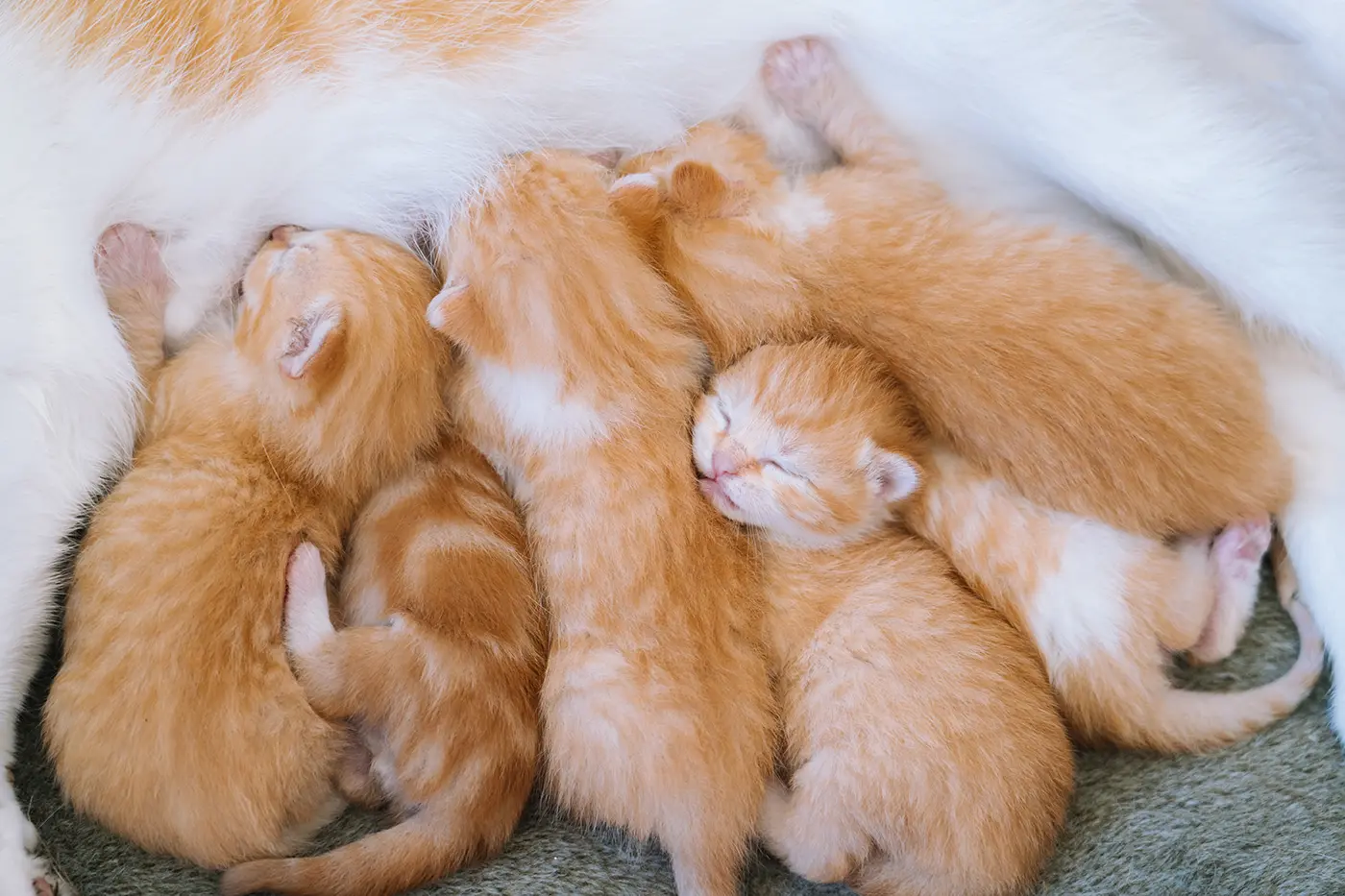
During the first 10 days after birth, the cat is very alert, ready to attack anyone who threatens her cubs, and leaves the nest only to feed. It is recommended that the bowl with food, water and even the litter box be as close as possible to the cat's bed. It is recommended that even after birth, the cat should have food rich in protein and calcium.
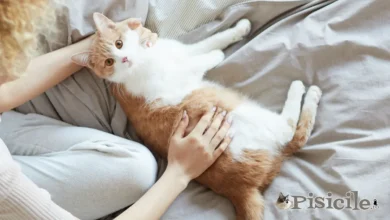

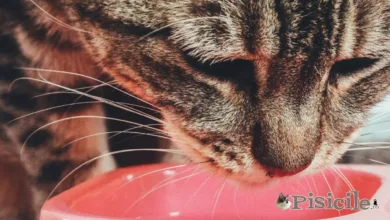
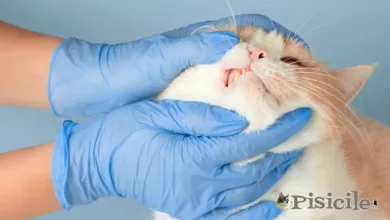
One Comment